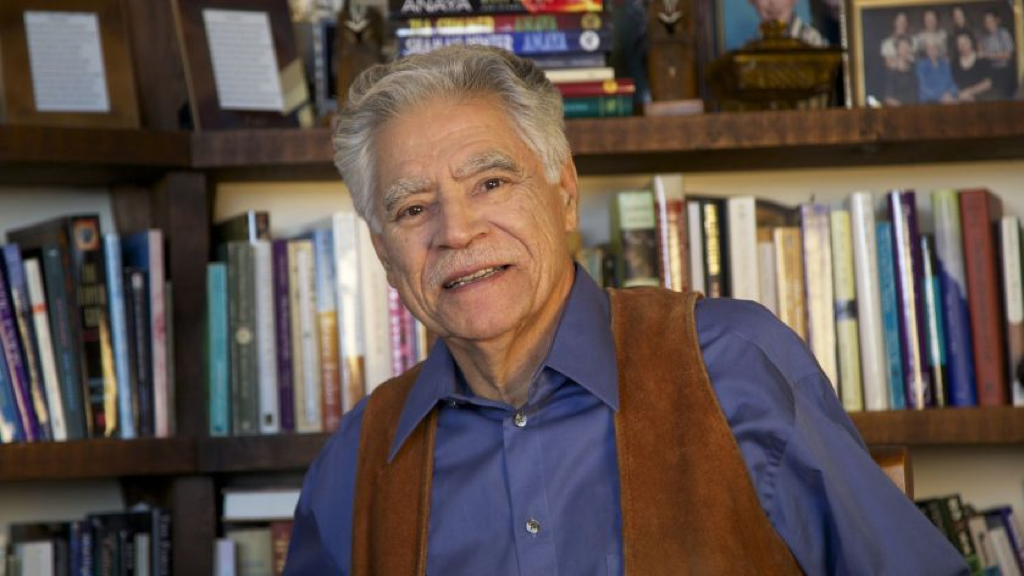Rudolfo Anaya (top) died on Sunday, June 28. The renowned author best known for Bless Me, Ultima, grew up in the Albuquerque, New Mexico neighborhood “Barelas”, historically known as one of the poorest neighborhoods in the city, (bottom right). Photo credit: Arenas Entertainment, Grand Central Publishing, Wikimedia Commons
By Luna Olavarria Gallegos, Pulso
Author Rudolfo Anaya, known as the “Grandfather of Chicano literature,” died at 82-years-old on Sunday, June 28, his niece Belinda Henry told the Associated Press on Tuesday.
Anaya’s most famous work, Bless Me, Ultima, a coming-of-age story of a young boy and his curandera mentor in the 1940s, is recognized as a landmark for Chicano novels. It helped launch the 1970s Chicano Literary Movement, which uplifts the Latinos of the Southwest who inhabited the land long before it belonged to the U.S.
Bless Me, Ultima has been repeatedly banned from school districts across the country because critics claim that it contains themes of “satanism”, according to the American Library Association.
“Bless Me, Ultima changed my life,” wrote Ariane Navarro, one of many Latino writers touched by this literary giant’s work, reacting to his death on social media. “Rudolfo Anaya, perhaps better than any other author, truly captured what it means to be a New Mexican, what it means to be born here, grow up here and live here,” wrote New Mexico Governor, Michelle Luján Grisham, in a written statement on Tuesday.
As politicians, writers, and activists remember the author and his impact, here are six things to know about him.
- Bless Me, Ultima became symbolic for Chicanos in the Southwest — Based on his own upbringing, this prestigious novel, published in 1972, sought to humanize the people from his community in New Mexico. Anaya grew up in “Barelas,” known then and today as one of Albuquerque’s poorest neighborhoods. “One reason that I wrote Bless Me, Ultima was because, to me, the people I grew up with were so beautiful, I didn’t want them to disappear,” he said during a 2017 interview.
- Honored with a film and an opera — Bless Me, Ultima was adapted as an opera and a feature-length film (the film is currently available on Google’s streaming service).
- Ultima has been banned — The mystical story about a young boy and a curandera has been banned by multiple school districts for being “anti-Catholic,” and citing content that has “satanism,” according to the National Coalition Against Censorship.
- A celebrated writer — He accumulated many literary accolades, including the Premio Quinto Sol National Chicano literary award, the 2007 Notable New Mexican Award and the PEN Center USA West Award for his novel Alburquerque. And in 2016, Anaya was awarded the National Humanities Medal that only up to 12 people receive each year. It was a prestigious honor from President Barack Obama for the author’s contributions in “pioneering stories of the American Southwest.”
President Barack Obama honoring Anaya with the National Humanities Medal in 2016 at a ceremony in Washington, D.C. Photo: Getty Images
- He wrote about New Mexico like never before — New Mexico is a state defined by its deep history of Spanish conquest and indigenous culture. Anaya’s books, Zia Summer, Rio Grande Fall, Jalamanta, and Heart of Aztlan, include this history that was not widely known before his work was published.
- He was an educator at heart — Rudolfo Anaya wrote Bless Me, Ultima in the evenings after teaching at a high school in Albuquerque. Throughout his career he gave readings at local bookstores. “The Farolitos of Christmas” and “Maya’s Children” are two books he wrote for children.
While Latinos have found a few more avenues to publish work, Rudolfo Anaya’s story shows it wasn’t always easy to embrace Chicano culture. He paved the way for many. “Of course I’m sad we lost a giant but in a way, I’m happy he left a legend,” said Cheo Torres, colleague and friend of Anaya.




